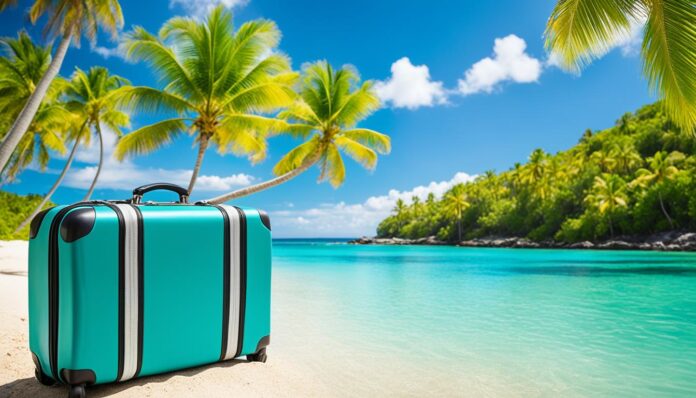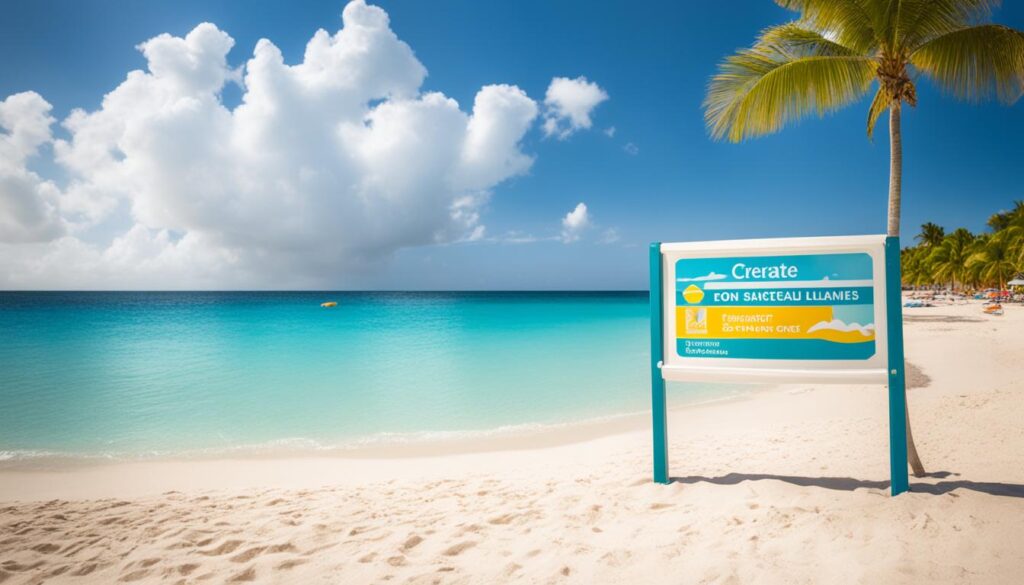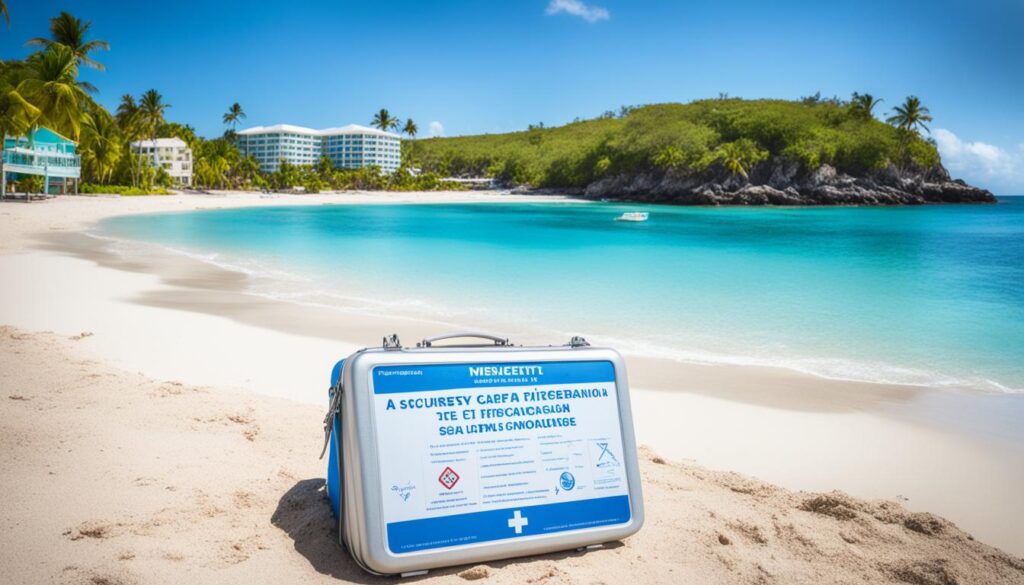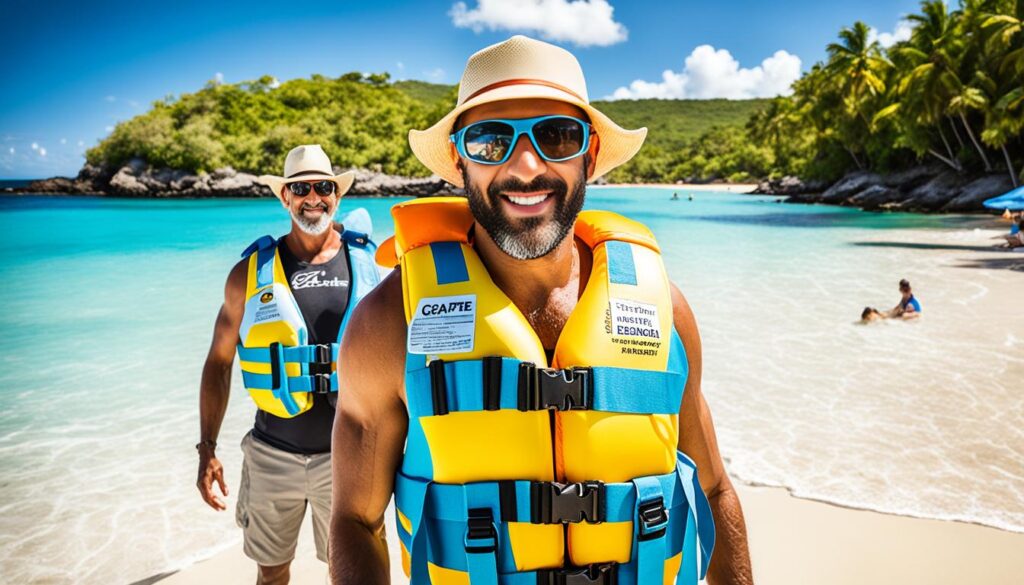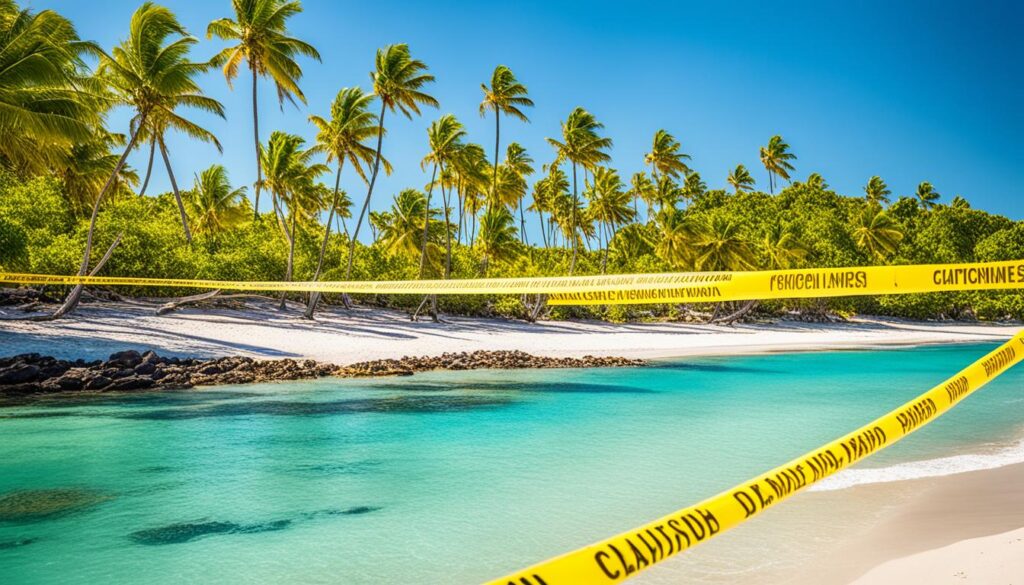Are you dreaming of a tropical vacation in the Caribbean? Crystal-clear waters, palm-fringed beaches, and vibrant cultures await you. But before you set off on your adventure, have you considered the safety and health aspects of your trip? Is safe travel to the Caribbean a given or a misconception?
In this article, we will delve into the essential safety and health considerations for your Caribbean travel. Whether you’re planning a getaway to popular destinations like Jamaica, the Bahamas, or the Dominican Republic, it’s crucial to be aware of potential risks and take necessary precautions for a worry-free vacation.
From understanding safety guidelines and health precautions to managing travel insurance and cultural considerations, we’ll provide you with all the information you need to ensure a memorable and secure experience in the Caribbean. So, let’s delve into the details and discover how to make the most of your tropical getaway while prioritizing safety and well-being.
Understanding Safety Guidelines in the Caribbean
Before embarking on your Caribbean adventure, it’s essential to familiarize yourself with the safety guidelines specific to the region. By being aware of potential risks and taking necessary precautions, you can ensure a safe and enjoyable trip. In this section, we will discuss general safety guidelines to help you stay protected during your Caribbean vacation.
General Safety Precautions
When traveling to the Caribbean, it’s important to keep the following safety guidelines in mind:
- Avoid displaying valuable items in public places to minimize the risk of theft.
- Stay in well-lit and populated areas, especially at night.
- Be cautious when exploring unfamiliar areas and research your destination beforehand.
- Keep important documents, such as your passport, in a secure place.
- Use trusted transportation services or reputable taxi companies.
- Keep emergency phone numbers and contact information readily accessible.
Water Activities and Nightlife
The Caribbean offers an abundance of water activities and vibrant nightlife options. However, safety precautions should be taken to ensure a memorable experience:
- Observe and adhere to beach warning signs and lifeguard instructions.
- Only swim in designated areas with a lifeguard present.
- Avoid excessive alcohol consumption, especially when participating in water activities.
- Ensure you are familiar with basic water safety techniques, such as swimming and snorkeling.
- When enjoying the nightlife, travel in groups and stay in well-lit areas.
“Your safety should always be a top priority when traveling. By following the safety guidelines specific to the Caribbean, you can relax and enjoy your vacation to the fullest.”
Remember, these are general safety guidelines, and it’s important to research the specific safety recommendations for your intended Caribbean destination. Taking precautions and being aware of your surroundings will contribute to a secure and worry-free vacation.
Emergency Contacts
In case of any emergency during your trip, it’s essential to have the necessary contact information readily available. Here are some important contacts to keep in mind:
| Emergency Service | Phone Number |
|---|---|
| Police | 911 |
| Ambulance | 911 |
| Fire Department | 911 |
| Embassy/Consulate | Contact your respective country’s embassy/consulate in the Caribbean |
Make sure to save these numbers in your phone and have a printed copy as a backup. Additionally, it’s a good idea to inform your accommodation provider about any allergies or medical conditions you may have to ensure proper assistance, if needed.
Health Precautions for Caribbean Travelers
When traveling to the Caribbean, it’s important to prioritize your health and take necessary precautions to ensure a safe and enjoyable trip. By following these health tips and guidelines, you can minimize the risk of illness and fully embrace the beauty of the Caribbean without worry.
Vaccinations
Before traveling to the Caribbean, make sure you are up to date with routine vaccinations, including measles-mumps-rubella (MMR), diphtheria-tetanus-pertussis, varicella (chickenpox), polio, and influenza. Additionally, consult with your healthcare provider regarding recommended vaccinations specific to the Caribbean, such as hepatitis A and typhoid.
Sun Protection
The Caribbean boasts sunny skies and beautiful beaches, but excessive sun exposure can lead to sunburns, heatstroke, and skin damage. Protect yourself by wearing sunscreen with at least SPF 30, a wide-brimmed hat, sunglasses, and lightweight, breathable clothing. Seek shade during peak sun hours, usually between 10 am and 4 pm.
Food and Water Safety
Enjoy the flavors of Caribbean cuisine while staying mindful of food and water safety. Stick to bottled or purified water and avoid tap water. Wash your hands often, especially before eating, and choose freshly cooked foods. Be cautious of street vendors and ensure that meat and seafood are thoroughly cooked.
Common Illnesses
While in the Caribbean, there are a few common illnesses to be aware of. Mosquito-borne diseases, such as dengue fever, chikungunya, and Zika, are prevalent in some Caribbean countries. Protect yourself by wearing insect repellent and covering exposed skin. Additionally, traveler’s diarrhea can be a concern, so remember to practice good hygiene and avoid consuming undercooked or raw foods.
“Maintaining good health is crucial when traveling to the Caribbean. By taking the necessary health precautions, you can fully enjoy your tropical getaway.”
| Health Precautions | How to Stay Safe |
|---|---|
| Vaccinations | Ensure you are up to date with routine vaccinations and consult with your healthcare provider for recommended vaccinations specific to the Caribbean. |
| Sun Protection | Wear sunscreen, a wide-brimmed hat, sunglasses, and lightweight clothing. Seek shade during peak sun hours. |
| Food and Water Safety | Stick to bottled or purified water, wash your hands often, and choose freshly cooked foods. Be cautious of street vendors. |
| Common Illnesses | Protect yourself from mosquito-borne diseases by wearing insect repellent and covering exposed skin. Practice good hygiene to avoid traveler’s diarrhea. |
Caribbean Travel Health Risks
While the Caribbean is renowned for its idyllic beaches and vibrant culture, it’s crucial for travelers to be aware of potential health risks. This section will provide an overview of the specific challenges you may encounter during your Caribbean trip, including mosquito-borne diseases, heat-related illnesses, and the importance of travel insurance.
Mosquito-Borne Diseases
One of the primary health risks in the Caribbean is mosquito-borne diseases. These include dengue fever, Zika virus, and chikungunya. Mosquitoes are most active during dawn and dusk, so it’s important to take preventive measures to avoid mosquito bites.
- Apply insect repellent with at least 20% DEET to exposed skin.
- Wear long-sleeved shirts and long pants, especially during peak mosquito activity times.
- Stay in accommodations with air conditioning or effective window and door screens.
- Remove standing water where mosquitoes can breed, such as in flower pots, buckets, or birdbaths.
Heat-Related Illnesses
The Caribbean’s tropical climate can cause heat-related illnesses, especially during the hot summer months. To stay safe and prevent heat exhaustion or heatstroke:
- Stay hydrated by drinking plenty of water and avoiding excessive alcohol and caffeine.
- Seek shade or air-conditioned environments during the hottest times of the day.
- Wear lightweight, loose-fitting, and light-colored clothing to promote airflow and reflect sunlight.
- Take frequent breaks and rest in cool areas to avoid overexertion.
“When visiting the Caribbean, it’s crucial to prioritize your health and take necessary precautions to prevent mosquito-borne diseases and heat-related illnesses.” – Dr. Maria Fernandez, Travel Medicine Specialist
Importance of Travel Insurance
Travel insurance is essential when visiting the Caribbean. It provides coverage for unexpected medical expenses, emergency medical evacuation, trip cancellation, and other unforeseen circumstances. In case of a medical emergency, it offers financial protection and access to quality medical care. Ensure your travel insurance covers medical expenses and evacuation to your home country.
| Health Risk | Preventive Measures |
|---|---|
| Mosquito-Borne Diseases | Apply insect repellent, wear protective clothing, and eliminate mosquito breeding areas. |
| Heat-Related Illnesses | Stay hydrated, seek shade, wear appropriate clothing, and take breaks in cool areas. |
| Travel Insurance | Ensure comprehensive coverage for medical expenses and emergency evacuation. |
Staying Safe in Popular Caribbean Destinations
When traveling to the Caribbean, it’s important to prioritize your safety in popular destinations. Whether you’re exploring vibrant markets, visiting iconic attractions, or immersing yourself in the local culture, following some essential safety tips can ensure a worry-free experience.
1. Be aware of your surroundings: While enjoying the bustling markets or crowded tourist spots, always stay vigilant and keep an eye on your belongings. Avoid displaying expensive jewelry or gadgets that may attract unwanted attention.
2. Use trusted transportation: When moving around the Caribbean, it’s advisable to use reputable transportation providers, such as licensed taxis or hotel shuttles. If you decide to rent a car, ensure that it’s from a reliable company and follow local traffic rules.
3. Research the local customs: To have a more meaningful experience, learn about the local customs and etiquette. Greeting locals with a smile and showing respect for their traditions can help foster positive interactions.
“Traveling is a privilege. Respect the local customs and treat others with kindness.”
4. Stay informed about potential risks: Before visiting a specific destination, research the current situation and any potential risks that may be present. Check with local authorities or browse reliable travel websites for the latest updates.
5. Stay hydrated and use sunscreen: The Caribbean’s tropical climate can be hot and humid, so it’s essential to stay hydrated by drinking plenty of water. Additionally, protect your skin from the intense sun rays by wearing sunscreen with a high SPF.
Tips for Interacting with Locals
Interacting with locals can provide a deeper understanding of the Caribbean’s culture and traditions. Here are some tips for making meaningful connections:
- Show genuine interest in the local culture and traditions.
- Learn a few basic phrases in the local language.
- Respect personal space and boundaries.
- Observe and follow local customs and dress codes.
By following these safety tips and embracing the local culture, you can have a memorable and secure experience in popular Caribbean destinations.
Beach and Water Safety in the Caribbean
The pristine beaches and crystal-clear waters of the Caribbean are irresistible to travelers. However, it’s crucial to prioritize safety and follow the Caribbean safety guidelines when indulging in these natural marvels. Whether you’re swimming, snorkeling, or participating in water sports, taking precautionary measures ensures a worry-free experience.
Here are some essential tips to stay safe in the Caribbean waters:
- Know the conditions: Prior to entering the water, familiarize yourself with the local marine conditions, including tides, currents, and potential hazards.
- Swim in designated areas: Stick to designated swimming areas where lifeguards are present, as they can provide immediate assistance in case of emergencies.
- Be cautious of rip currents: Rip currents are strong currents that flow away from the shore. If caught in a rip current, swim parallel to the shore until you escape its pull.
- Use proper snorkeling equipment: When snorkeling, ensure you have a properly fitted mask, snorkel, and fins. Familiarize yourself with the equipment beforehand and practice your snorkeling skills in calm waters.
- Keep an eye on the weather: Pay attention to weather forecasts and avoid swimming or participating in water activities during inclement weather or strong winds.
Remember, the safety of yourself and your loved ones should always be your top priority when enjoying the beauty of the Caribbean waters.
By following these guidelines, you can have a safe and enjoyable time exploring the breathtaking underwater world while basking in the Caribbean sun.
| Beach and Water Safety Tips | Key Points |
|---|---|
| Know the conditions | Familiarize yourself with local marine conditions, like tides and currents. |
| Swim in designated areas | Stick to areas with lifeguards for immediate assistance. |
| Be cautious of rip currents | If caught in a rip current, swim parallel to the shore to escape. |
| Use proper snorkeling equipment | Ensure a properly fitted mask, snorkel, and fins for safe snorkeling. |
| Keep an eye on the weather | Avoid swimming during inclement weather or strong winds. |
Following these tips will help you have a safe and memorable experience while enjoying the stunning beaches and waters of the Caribbean.
Ensuring Travel Insurance and Medical Assistance
When planning your Caribbean trip, it is crucial to prioritize your safety and well-being. One essential aspect to consider is having adequate travel insurance and access to medical assistance. Unexpected accidents or illnesses can happen, and being prepared can provide you with peace of mind throughout your journey.
In this section, we will discuss the importance of travel insurance, the necessary coverage you should consider, and the steps you should take in case of a medical emergency during your Caribbean travel.
The Importance of Travel Insurance
Travel insurance is a vital investment that can protect you from unforeseen circumstances and cover potential financial losses during your trip. It offers various benefits, including:
- Medical coverage: This ensures that you receive necessary medical treatments and assistance if you fall ill or get injured while traveling.
- Trip cancellation or interruption coverage: This protects your investment in case you need to cancel or cut short your trip due to unexpected events, such as illness, natural disasters, or other emergencies.
- Lost or delayed baggage coverage: This provides compensation for lost, stolen, or delayed luggage, helping you replace essential items quickly.
- Emergency evacuation coverage: This covers the cost of emergency medical evacuation or transportation to the nearest appropriate medical facility.
- 24/7 travel assistance: This ensures you have access to a helpline for immediate support, such as medical referrals, travel advice, and assistance during emergencies.
Before selecting a travel insurance plan, it is crucial to carefully review the policy coverage, limitations, and exclusions. Ensure that it meets your specific needs and covers the activities you plan to participate in during your Caribbean travel.
Necessary Coverage for Caribbean Travel
When choosing travel insurance for your Caribbean trip, consider the following coverage options:
- Medical expenses: Ensure your policy covers emergency medical expenses, hospitalization, doctor visits, medications, and emergency medical evacuation if necessary.
- Trip cancellation or interruption: Select coverage that protects your non-refundable travel expenses in case of unexpected events that force you to cancel or cut short your trip.
- Lost or delayed baggage: Look for coverage that reimburses you for lost, stolen, or delayed baggage, providing compensation for essential items while you are in the Caribbean.
- Travel delays: Choose coverage that compensates you for additional expenses incurred due to unexpected travel delays, such as accommodations and meals.
- Emergency assistance: Ensure your policy offers 24/7 travel assistance, including medical referrals, language interpretation services, and emergency evacuation if required.
Remember to thoroughly read and understand the policy terms and conditions, including any exclusions and limitations. If you have any questions or uncertainties, don’t hesitate to contact the insurance provider for clarification.
Steps to Take in Case of a Medical Emergency
- Stay calm and assess the situation: If you or someone you are traveling with experiences a medical emergency, try to remain calm and evaluate the severity and urgency of the situation.
- Seek immediate medical assistance: If the situation requires urgent medical attention, call the local emergency hotline or ask the hotel staff to contact medical professionals.
- Contact your travel insurance provider: Inform your travel insurance provider about the medical emergency as soon as possible. They can guide you on the next steps to take and provide necessary medical assistance.
- Follow the instructions and recommendations: Cooperate with the medical professionals and follow their advice and treatment recommendations. Your insurance provider can coordinate with the medical facility to ensure seamless assistance.
- Keep all relevant documentation: Collect and keep all medical documents, receipts, and reports related to the emergency. These will be necessary for filing insurance claims.
- Notify your emergency contact: Inform your emergency contact person about the situation and provide them with necessary details and contact information.
- Keep your insurance policy information accessible: Carry a copy of your travel insurance policy documents with you at all times, including the contact details of your insurance provider.
By following these steps and having the appropriate travel insurance coverage in place, you can ensure that you receive the necessary support and assistance during a medical emergency in the Caribbean.
Travel insurance is like a safety net that can provide you with peace of mind while exploring the stunning Caribbean destinations. It offers financial protection and access to necessary medical assistance, allowing you to enjoy your trip worry-free.
Now that you understand the importance of travel insurance and the steps to take in case of a medical emergency, you can confidently embark on your Caribbean adventure. Remember to prioritize your safety and well-being at all times, and ensure you have comprehensive travel insurance coverage to address any unforeseen circumstances that may arise.
| Benefits of Travel Insurance | Types of Coverage |
|---|---|
| Medical coverage | Medical expenses |
| Trip cancellation or interruption coverage | Trip cancellation or interruption |
| Lost or delayed baggage coverage | Lost or delayed baggage |
| Emergency evacuation coverage | Emergency assistance |
| 24/7 travel assistance | Travel delays |
Cultural Considerations for Travelers in the Caribbean
When visiting the Caribbean, it’s important to be mindful of the diverse cultures and traditions that make up this vibrant region. Respecting local customs and etiquette will not only enhance your experience but also show appreciation for the local community. Here are some cultural considerations to keep in mind during your Caribbean travels:
Respectful Behavior
Caribbean locals value respectful behavior, and it’s essential to be polite and courteous when interacting with them. Remember to use common greetings such as “good morning” or “good afternoon,” and always say “please” and “thank you.” Being respectful also means being aware of your surroundings and refraining from loud or disruptive behavior, especially in sacred or religious sites.
Dress Codes
While the Caribbean is known for its relaxed and casual atmosphere, it’s important to dress appropriately, especially when visiting religious or cultural sites. Some locations may require conservative attire, such as covering shoulders or legs. Additionally, beachwear should be limited to designated areas, and it’s advisable to bring a cover-up or shawl to respect local customs.
Etiquette with Locals
Interacting with locals is a wonderful opportunity to learn about their traditions and way of life. Here are some etiquette tips to help you navigate these interactions:
- Avoid touching someone’s head, as it is considered disrespectful in many Caribbean cultures.
- Engage in conversations with an open mind and show genuine interest in local customs and traditions.
- Be mindful of personal space and avoid invading someone’s privacy.
Remember, a simple smile can go a long way in bridging cultural differences and fostering positive connections with locals.
| Do’s | Don’ts |
|---|---|
| Do learn a few basic phrases in the local language. | Don’t make assumptions or stereotypes about the local culture. |
| Do accept invitations for cultural events or celebrations. | Don’t disregard local customs or traditions. |
| Do ask permission before taking photographs of people. | Don’t haggle excessively when shopping from local vendors. |
By embracing the cultural diversity of the Caribbean and showing respect for local customs, you will have a more enriching and immersive travel experience. Take the time to learn about the unique traditions of each island you visit, and enjoy the warm hospitality that the Caribbean has to offer.
Conclusion
Traveling to the Caribbean can be an incredible experience filled with sun, sand, and vibrant culture. However, it’s crucial to prioritize your safety and health to make the most of your tropical getaway. By following the guidelines and tips provided in this article, you can ensure a worry-free journey.
Plan ahead and familiarize yourself with the safety guidelines specific to the Caribbean region. Take precautions to avoid theft, stay safe in unfamiliar areas, and be cautious when indulging in water activities and nightlife. Additionally, remember to pay attention to your health by getting the necessary vaccinations, protecting yourself from the sun, and practicing food and water safety.
As you explore the stunning beaches and immerse yourself in the local culture, it’s essential to be aware of potential health risks. Be vigilant about mosquito-borne diseases, stay hydrated to prevent heat-related illnesses, and consider investing in comprehensive travel insurance.
Overall, a memorable trip to the Caribbean begins with careful planning, staying informed, and taking necessary precautions. Incorporate the cultural considerations, such as respectful behavior and proper etiquette, to enhance your experiences with the locals. So pack your bags, embrace the Caribbean’s beauty, and embark on an unforgettable adventure while prioritizing your safety and well-being.




























